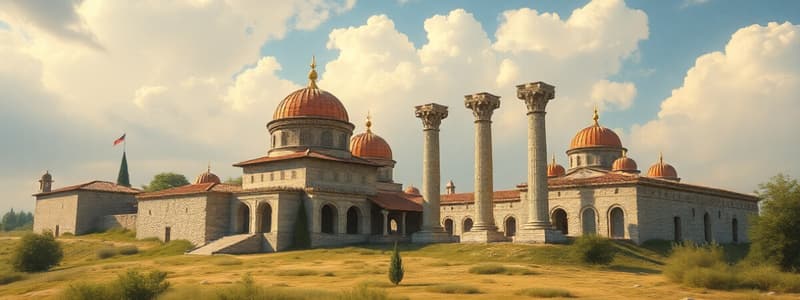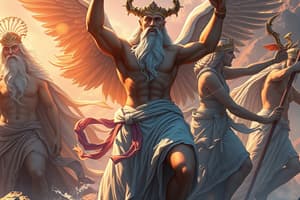Podcast
Questions and Answers
Which Greek deity is NOT mentioned as being worshiped by the Rhos people?
Which Greek deity is NOT mentioned as being worshiped by the Rhos people?
- Artemis
- Demeter
- Aphrodite (correct)
- Zeus
What is suggested about the origin of the Rhos people in relation to Byzantine sources?
What is suggested about the origin of the Rhos people in relation to Byzantine sources?
- They were primarily Greek in identity.
- They were definitively identified as Vikings.
- They were a Celtic group.
- Their origins are unclear but they may have been Slavic. (correct)
In what year did the Viking attack on Constantinople take place?
In what year did the Viking attack on Constantinople take place?
- 880 AD
- 860 AD (correct)
- 850 AD
- 870 AD
Which emperor's writings provide insight into the historical context of the Rhos people?
Which emperor's writings provide insight into the historical context of the Rhos people?
What aspect of life was primarily associated with the worship of deities like Artemis, Demeter, and Zeus among the Rhos?
What aspect of life was primarily associated with the worship of deities like Artemis, Demeter, and Zeus among the Rhos?
Flashcards
Who were the Rhos?
Who were the Rhos?
The Rhos people were a group of people who lived in the region of what is now Russia during the late Byzantine period.
What were the Rhos' religious practices?
What were the Rhos' religious practices?
The Rhos people worshipped Greek deities like Artemis, Demeter, and Zeus, who were associated with agriculture and fertility.
What can we learn about the Rhos' origins from Byzantine sources?
What can we learn about the Rhos' origins from Byzantine sources?
Byzantine sources don't provide enough information to definitively confirm the origin of the Rhos people.
Who is Constantine VII Porphyrogenitus?
Who is Constantine VII Porphyrogenitus?
Signup and view all the flashcards
What was the Viking attack on Constantinople in 860 AD?
What was the Viking attack on Constantinople in 860 AD?
Signup and view all the flashcards
Study Notes
Ancient Greek Deities and Heroes
- Worship of Greek deities like Artemis, Demeter, Cybele, Zeus, Athena, Apollo, Dionysus, Asclepius, Poseidon, Hermes, and Heracles was common
- Heracles, initially a hero, was later deified
- Places of worship reflected agricultural and fertility themes
Byzantine Empire and the Rus'
- Byzantine sources describe the Rus' people
- The Rus' were connected to Scythian origins, possibly Slavic or Scandinavian
- Byzantine accounts show the Rus' attacking Constantinople in 860
Rus' Identities and Military Actions
- The Rus' challenged Byzantine dominance in the 9th century
- The Rus' naval attack on Constantinople in 860 was repelled, demonstrating Byzantine military resilience
- The Byzantine emperor Constantine Porphyrogenitus's writings detailed information about the Rus'
- The Rus' are identified as Slavic through their language and cultural practices, evident in their interaction with the Byzantines
Studying That Suits You
Use AI to generate personalized quizzes and flashcards to suit your learning preferences.




